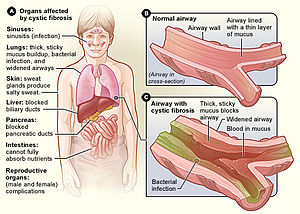
Back Sistiese fibrose Afrikaans تليف كيسي Arabic Fibrosis quística AST Sistik fibroz Azerbaijani کیستیک فیبروزیس AZB Cistična fibroza BS Fibrosi quística Catalan سیستیک فایبرۆسس CKB Cystická fibróza Czech Ffibrosis systig Welsh
| Cystic fibrosis | |
|---|---|
| Other names | Mucoviscidosis |
 | |
| Medical specialty | Medical genetics, pulmonology |
| Symptoms | Difficulty breathing, coughing up mucus, poor growth, fatty stool[1] |
| Usual onset | Symptoms recognizable ~6 month[2] |
| Duration | Long term[3] |
| Causes | Genetic (autosomal recessive)[1] |
| Risk factors | Genetic |
| Diagnostic method | Sweat test, genetic testing[1] |
| Treatment | Physiotherapy, antibiotics, pancreatic enzyme replacement, cystic fibrosis transmembrane conductance regulator modulators, lung transplantation[4] |
| Prognosis | Life expectancy between 42 and 50 years (developed world)[5] |
| Frequency | 1 out of 3,000 (Northern European)[1] |
Cystic fibrosis, also known as mucoviscidosis, CF, and 65 roses, is an obstructive lung condition a person may get from their parents. It makes the body produce thick, sticky mucus, which builds up in the lungs, the digestive system, pancreas, and other parts of the body.[6] It also affects the bones.
People with cystic fibrosis need yearly checks for CF-related diabetes in addition to all of the problems it can cause.
If both parents have the cystic fibrosis gene, and pass it into their child, the child will have cystic fibrosis. A cystic fibrosis gene is needed from each parent. The parent might not have cystic fibrosis but still might have the gene. A person with cystic fibrosis is not contagious (they cannot give it to anyone else).
There is no cure for cystic fibrosis, but there are a lot of medications that help keep people healthy.[7] 1 out of every 3,000 northern Europeans are affected by CF.
- ↑ 1.0 1.1 1.2 1.3 Cite error: The named reference
O2009was used but no text was provided for refs named (see the help page). - ↑ Allen JL, Panitch HB, Rubenstein RC (2016). Cystic Fibrosis. CRC Press. p. 92. ISBN 9781439801826. Archived from the original on 2017-09-08.
- ↑ Cite error: The named reference
Mas2013was used but no text was provided for refs named (see the help page). - ↑ Shteinberg M, Haq IJ, Polineni D, Davies JC (June 2021). "Cystic fibrosis". Lancet. 397 (10290): 2195–2211. doi:10.1016/s0140-6736(20)32542-3. PMID 34090606. S2CID 235327978.
- ↑ Cite error: The named reference
Ong2015was used but no text was provided for refs named (see the help page). - ↑ "Cystic fibrosis". ncbi.nlm.nih.gov. 2011. Retrieved 7 November 2011.
- ↑ Stites DP, Caldwell J, Carr MC, Fudenberg HH (1975). "Ontogeny of immunity in humans". Clin Immunol Immunopathol. 4 (4): 519–27. doi:10.1016/0090-1229(75)90093-8. PMID 0001167.
{{cite journal}}: CS1 maint: multiple names: authors list (link)